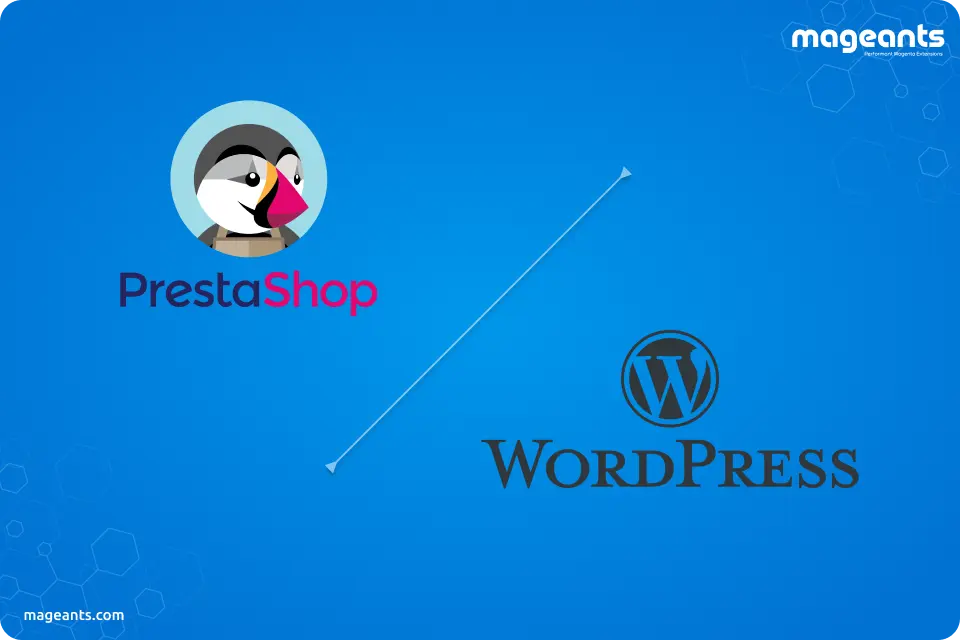
Magento vs WordPress: Which Is Better for Your eCommerce Store?

For years, Magento was the leading open-source eCommerce solution. In this article, we compare Magento vs WordPress as the platforms of choice for developing an eCommerce store.
WordPress powers approximately 43% of the world's websites. Thanks to its ease of use, low cost, and vast resources available, it’d seen like a no-brainer to choose WordPress over Magento. After all, WordPress is free, whereas Magento costs hundreds of dollars per month.
The truth is, neither platform is perfect, and both have their advantages and disadvantages. Before we dive into the details, let me first explain what these two ecommerce platforms actually do. These are the two leading open-source platforms (Magento and WordPress) for online stores.
Let’s see a detailed comparison between these two platforms and by the end of this article, you will have a much better idea of which platform will serve your business needs best.
What is Magento?
Magento (Adobe Commerce) is an ecommerce solution built specifically for online retailers. It was founded in 2007 with the goal of revolutionizing the way people buy things online. Magento is one of the powerful, well-established, free, and most popular open-source eCommerce platforms today. Since its launch, Magento has gained massive traction.
Magento offers solutions for every business, from small to large enterprises. Magento has almost 167,571 live websites and powers almost 8% of all eCommerce platforms available on the market. Magento has three editions like Magento Open Source, (formerly Community Edition), Magento Commerce (formerly Enterprise Edition), and Magento Commerce Cloud Edition. One can use any version of Magento as per their business requirements.

Pros and Cons
| Pros | Cons |
|---|---|
| Highly Scalable & Flexible | High Ownership & Development Cost |
| Unlimited & Advance Customization | Require Technical Knowledge |
| Omnichannel | Better hosting environment required |
| Better Security | Slower Development |
| Larger Community | Complexity |
| Rich in features | Steep Learning Curve |
| SEO Friendly | Time Consuming |
| Fast Performance | High Maintenance |
What is WordPress?
WordPress is the world's best-selling open-source content management system (CMS) and is also one of the big eCommerce giants in this eCommerce world. It offers a user-friendly interface to anyone, regardless of their technical experience. WordPress is a free CMS that can easily be customized. While it doesn’t have any advanced eCommerce features, it does offer great flexibility to build websites without having to invest a ton of money. However, if you plan on selling products, then you should consider using the WooCommerce plugin instead.

Pros and Cons
| Pros | Cons |
|---|---|
| Ease to use & Scalable | No phone-based support |
| Limitless Customization | Doesn't come with a domain |
| Large plugin library | Premium extensions and hidden cost |
| SEO Optimized | WordPress' knowledge is a must |
| User Friendly | Have a bit of a learning curve |
| Powerful CMS | Slow Performance |
Magento vs WordPress: The Similarities
Let’s have a look at some similarities between both Magento and WordPress:
- Magento and WordPress, are both open-source platforms!
- Totally free to download and install.
- Both are superb eCommerce platforms with tons of add-ons and extensions and powerful features.
- Both Magento and WordPress can support regular site pages, blog posts, shopping carts, products, order history, and customer accounts.
- These both platforms required basic technical knowledge, and non-techies won’t be able to crack these platforms.
Without further ado, let’s jump into details with all the key comparison components between WordPress vs Magento via this blog.
Magento vs WordPress: The Detailed Comparison
We have tried to highlight key features from two popular ecommerce platforms, Magento vs WordPress, and will leave you to review, consider and give your final decision to shopping for the platform that is perfect and best fit for your business.
⦁ Ease of Use (User Friendliness)
Ease of Use, is one of the most important things to consider during the Magento and WooCommerce comparison. And there is no doubt both platforms come up with a well-designed user interface and are user-friendly.
WordPress is a popular Content Management System (CMS) that offers many features to help you build and maintain a website. It's built around themes that allow you to change the look of your site without touching code. You have complete control over what goes where, how it looks, and how your visitors interact with it. If you're familiar with HTML and CSS, you'll feel right at home with WordPress.
While on the other hand, Magento is robust, a bit complex, and at times it can be difficult to navigate around the system for which you need good technical knowledge to work with. To handle your site, you might require extensive training or need the help of a dedicated Magento developer, as Magento is much more complicated. Magento is not a beginner-friendly platform, but comes with a steep learning curve. Magento comes with advanced functionality and features that offer a lot of customization if required.
So, when it comes to ease of use, WordPress is way easier to use compared to Magento.
⦁ Costs
Let us share with you the pricing difference between Magento and WordPress so that you can easily decide your budget for an eCommerce store.
While both the platforms, Magento and WordPress, are free. Magento comes with 2 versions: Paid (Magento Commerce) and Free (Magento Open Source) and both. Any additional features, hosting service, security, domain, extension, and customization will add extra cost to your investment.
On the other hand, WordPress is free to install, but you have to pay for security, hosting service, extensions, domain, add-ons, etc. WordPress is more flexible in terms of pricing. It is much cheaper for hosting with WordPress as it has low hosting fees compared to the Magento platform.
Magento's additional costs are also expensive compared to WooCommerce.
⦁ Ecommerce
When it comes to building online stores, Magento is the more powerful platform.
WordPress was designed to be extremely user-friendly. There are plenty of plug-ins to make it easier to create and manage pages. WordPress is much simpler to use. Developers often say that it takes twice as long to build a custom theme for Magento compared to a standard WordPress install. Also, you won’t need as much technical knowledge for WordPress compared to Magento.
Magento is the more powerful platform when it comes to selling online. Magento comes with some advance and amazing sales features already built in, including recently viewed and compared products, free shipping options, creating different price points for different customer groups, such as wholesalers and retailers, adding multiple images per product listing, one-page checkout, etc.
⦁ Security
Both Magento and WordPress offer great security options. The WordPress platform was developed with security in mind. It supports multiple authentication methods including cookies, IP addresses, tokens, and custom forms. Advanced users can opt out of the default login mechanism to make sure their sites aren't vulnerable to brute force attacks. There are many plugins available to bolster its security.
On the other hand, Magento has rich and strict security, as for them the customer’s data and privacy are more important. Thus, to improve the website's performance, they offer regular security patch updates. Also, it is great to upgrade the store to the latest version in order to leverage the latest security features. To protect your store and data, you can also follow some best magento security tips.
⦁ SEO
Search engine optimization (SEO) is an ongoing process that helps your site show up high when people search for content related to your products and services online. A good-quality theme doesn't just make your site visually appealing; it also makes it easier to crawl and index by Google and other search engines.
WordPress comes preloaded with SEO features that let you quickly set up your site to appear higher in search results. However, Magento has powerful SEO options. One can customize every page of a website with relevant descriptions, titles, keywords, and meta titles. One can improve SEO rankings, but it could cost plenty of time and money.
Recommended Read: Best E-Commerce SEO Strategies
Recommended Read: Latest SEO Trends for eCommerce
⦁ Marketing and Content Management
There is no doubt that for marketing and content management, WordPress is better than Magento. In technical terms, WordPress is literally a CMS (content management system), and it started out as primarily a blogging platform. One can build any type of website using the WordPress platform, but as their main roots belong to blogging mean that this platform is well-equipped to handle massive amounts of media and content.
With Magento, to support blogging you'd need to utilize custom extensions because Magento does not include inbuilt blogging functionality. Magento relies on its Marketplace for marketing and promotion. You want to install the Magento extensions and furthermore depend on the Magento developers to incorporate such marketing tools to run your Magento eCommerce store.
⦁ Themes & Design Customization
Website design is one of the significant factors to attract customers. Website template or theme determines the store’s success and helps in making your business impression on customers. Website design has the power to make a business or break a business.
Woocommerce and Magento offer numerous themes for you to choose from, both free and paid. And in general, most of the templates, themes, or designs offered by these platforms are mobile-friendly and responsive.
Both platforms have strong design capabilities, but the website you need totally depends on the type of your website. Both platforms offer custom themes that demand the skills of an experienced developer, and ready-made themes that don’t require any coding. On both platforms, custom themes are higher quality and more unique, while ready-made themes are cheaper and easier.
Which platform would you pick? Well, if you don't mind learning a new platform or if you already know how to program, go ahead and choose Magento. If you are looking for a quick way to get an ecommerce store set up and a blog, however, go with WordPress.
Other Useful Guides:
Wrapping Up
We hope this guide helped you decide whether Magento or WordPress for eCommerce would be the best fit for your business. Both these eCommerce platforms provide excellent features and functionalities, and hence they are equally suitable for your eCommerce requirement. It’s totally dependent on your business needs, goals, and budget.
So, before you go ahead, think about how much functionality you need from your website, and whether you really need to customize the look of the site. Or maybe there are some tools you could use. Maybe you just need a simple landing page — just to get started.
We've got loads of articles, guides, tips & tricks to help you succeed! If you have any queries, feel free to get in touch with us. Our experts will help you to answer your queries.
